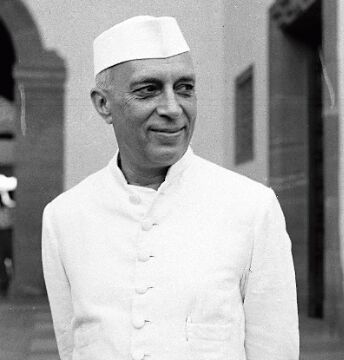The visionary
Nehru can be criticised for his policies but his towering contribution towards the shaping of Indian democracy cannot be written of

In his famous essay, 'Tradition and the Individual Talent', TS Eliot observed, "the historical sense involves a perception, not only of the pastness of the past, but of its presence''. So, when we try to unearth the process of historical progress of a nation, we cannot ignore certain individuals whose actions and intentions have gone on to shape the nation. It may be that these actions and intentions are not always beneficial. Pandit Jawaharlal Nehru is one such individual who is undeniably connected with the history of India — both before and after its independence. He cannot be written off as insignificant in the annals of Indian history.
Nehru took charge as Indian PM in trying times. The newly independent nation had scars of partition and genocide all over its body. Pandit Nehru, along with his compatriots, did his best to successfully allay the communal tensions and dilute the related phobia. Had it not happened, India would have been far more fractured — both geographically and psychologically. India needed unity and Pandit Nehru ensured it. The fruits of that unity continue to be enjoyed. Today, opinions are being floated about the Nehruvian sense of secularism, but would it really be possible to continue with a strong India by totally abnegating it? With his knowledge of history, Nehru knew India to be a melting pot of cultures and communities, and designed his policies on that basis.
When one talks about India, one refers to it as the world's largest democracy. This democratic legacy is what Pandit Nehru wanted to create. Once being interviewed by a noted American journalist, Norman Cousins, Pandit Nehru said "My legacy to India? Hopefully, it is 400 million people capable of governing themselves''. The number has risen from 400 million to 1.3 billion but the legacy remains. Nehru believed in the rights of the people to participate in the process of governance of the country. It is indeed a landmark that within five years of independence, the nation went to the polls in 1952. Most of the countries that became free with India took a much longer period to come into the proper electoral process; some of them are still struggling for democracy. As a PM, Pandit Nehru encouraged debate and bona fide political expression; he took his political opponents with tolerance and respect. Atal Bihari Vajpayee narrated one such incident when he had called Pandit Nehru a mixture of Chamberlain and Churchill, but met with a smiling Nehru who acknowledged his statement. This is the form of political behavior needed for all times, for without assimilative and democratic temperament, people cannot enjoy socio-political rights. In the direction of rural development, Pandit Nehru initiated the concept of Panchayati Raj on the recommendation of Balwant Rai Mehta Committee in 1957. The system has now become indispensable to modern India.
The problem is that today's generation knows globalisation but not cosmopolitanism. The society, therefore, sometimes follows jargon of claustrophobic sectarianism. Nehru urged us to look beyond our culture and develop a synthesis with various sects and their thoughts. In his economic approach Nehru was a socialist but did not follow Stalin's model. His pursuit to enhance education within the country resulted in formation of Institutes like IIMs and IITs, apart from education commissions for school and higher education. It was Nehru who prioritised research and development. In order to improve agriculture, a good number of dams were built under his government. After 75 years of independence, we can criticise Nehru's economic policies, but national planning was the need of the time then. In fact, the social sector cannot be brushed aside from the economy at any point in time. Economic policies have to change with time, but even today's India cannot go with a blatant run of privatisation. The economic debacle caused by the pandemic aptly justifies that we still need the socialist framework to an extent.
Pandit Nehru's foreign policy is often the point of criticism; there is no doubt that his idealistic attitude to real-politics led to the Kashmir debacle and the 1962 China war. At a time when the world was divided between the Soviet and the American block, Pandit Nehru's choice for non-alignment was not altogether unjustifiable. His 'Panchsheel' is relevant even today, for it is one of the earliest suggestions for global harmony, or further for nuclear disarmament. He certainly could not achieve everything he intended. There were moments when he was caught in a dilemma or he tried to collate everything and failed. He, at times, fumbled on economic decisions also, though the process of industrialisation and technological advancement, including nuclear research, started during his regime. His rule saw improvement in HDI, national income, and food and industrial production. He bequeathed the legacy of political internationalism to 'future India'. To be precise, no statesman can be absolutely successful. Pandit Nehru was no exception. Today, when we critically examine India's achievements, we are sure to find that the root of many of our successes is related to the regime of Pandit Jawaharlal Nehru — the 'Gentle Colossus' as Professor Hiren Mukherjee refers to him.
The writer is an educator from Kolkata. Views expressed are personal.



